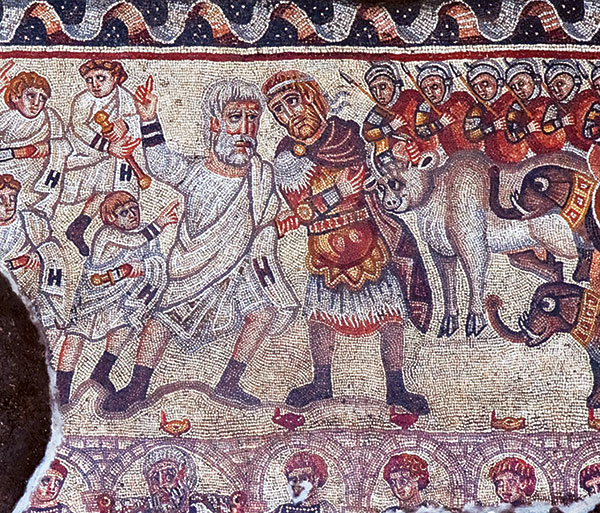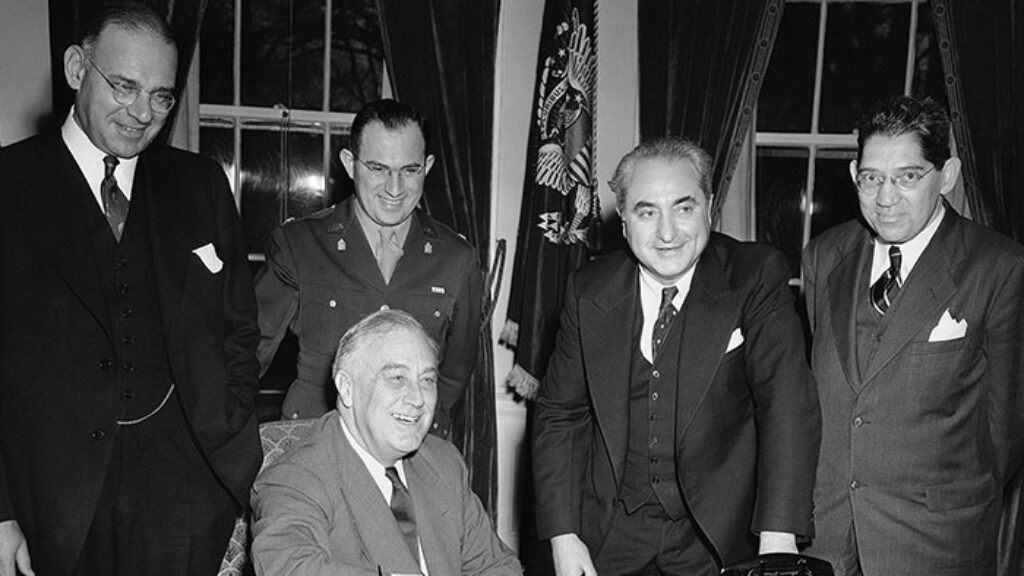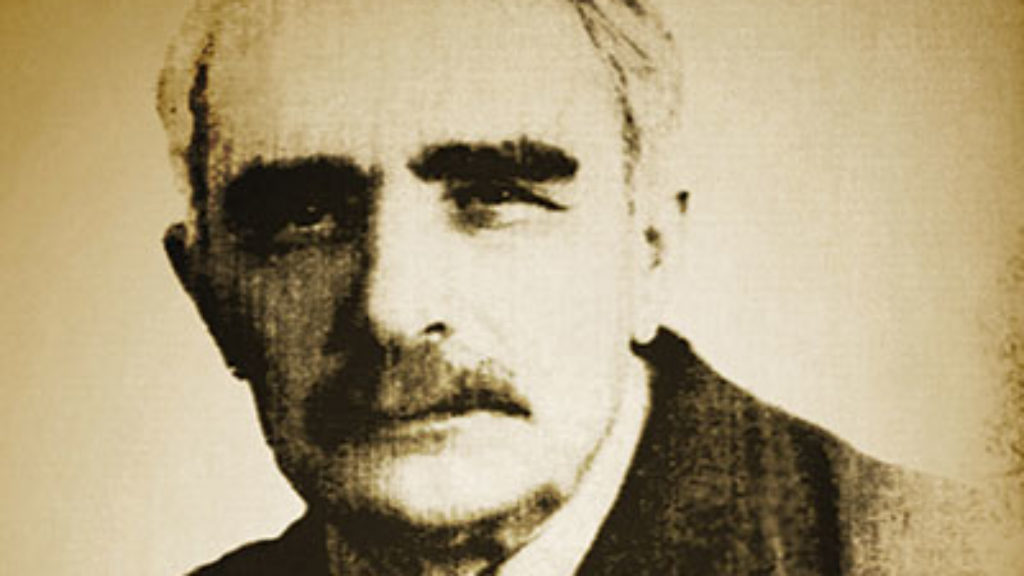God’s Law in Human Hands
A Judean, a Stoic, a Jewish philosopher, a Jesus follower, and a rabbi walk into a seminar room at Yale, and Professor Christine Hayes asks them, “What do you mean when you say divine law?”
Speaking first, Ezra the Scribe holds up a scroll and declares, “This is the Teaching of Moses with which God had charged Israel. He came down on Mount Sinai and spoke to them from heaven; He gave them right rules and true teachings, good laws and commandments.” The laws of the Torah certainly aim to instill righteousness, faith, and continuity, but their authority and divine status derive not from their contents or their aims but rather from their source. This divine law is particular to the people of Israel as part of a mutual covenant, which God can change at will. Indeed, humans can even instigate a change, as when the daughters of Zelophehad petitioned to inherit from their father.
Cicero, representing the Stoics, defines divine law as “right reason, in agreement with nature, diffused over everyone, consistent, everlasting.” The divine status of such law rests on its character, not its origin. It is universal and therefore not subject to interpretation, modification, or variation. If it could be changed and improved, then it was not perfect or true to begin with. For Cicero, Ezra’s written scroll has all the markings of human, fallible law. To a biblical Israelite like Ezra, on the other hand, the idea that a law can be divine not because God commanded it but just because it is rational would sound like gibberish, if not blasphemy.
These two world views could be kept separate for only so long. With Alexander the Great’s conquest of the Middle East, Hellenism penetrated into every crevice of the empire. Alexander may not have discussed the nature of God and divine law during his storied meeting with the Jewish high priest as he passed through Judea, but the subject was discussed in Jerusalem, Alexandria, and Rome over the next centuries. How might a committed, Bible-loving Jew react to the Stoic’s definition of divine law?
During the early 1st century C.E., the Jewish philosopher Philo of Alexandria reconciled his Hellenistic world view with the Bible by boldly retrofitting biblical law to conform to the standards of Greek divine law. Philo answered that the Torah is divine law precisely because its statutes are eternal expressions of the law of nature. While the Bible, for the most part, commanded the laws to Israel alone, Philo predicted a day when Israel’s law would become the universal law of a single world polity. This law preceded Sinai; even Abraham observed the law, not because he was commanded by God but because the law was ingrained in his natural constitution.
Ironically, Philo’s defense of Torah as natural law opened a path toward dispensing with it altogether. If one could access and internalize the laws of nature directly as Abraham did, then what need was there for the external rituals? Paul’s answer to Professor Hayes’s question is that divine law certainly isn’t the Torah. Mosaic law was a temporary set of rules promulgated at Sinai in order to keep the sinful Jews in check until Jesus’s redemption by faith.
Finally, Rabbi Joshua exclaims, “The Torah is not in heaven!” Divine law is not immutable natural law. It was given from heaven at Sinai, but it is now the possession of the sages to interpret as they best see fit.
A less confident moderator might not have the courage or talent to keep such a symposium of strong, clashing voices under control, but Hayes keeps the discussion proceeding civilly and productively in What’s Divine about Divine Law? She sets up Philo and Paul as polar opposites who both accept the Greek dichotomy between human and divine law and pull the Torah to one extreme or the other.
For Hayes, however, these and other writers in the Second Temple period serve as foils for rabbis such as Rabbi Joshua. The authors of the Talmud and midrashim inherited Ezra’s definition of divine law and affirm the authority of the Torah on account of its being commanded by God. They were aware of claims like Cicero’s that divine law must conform to reason, but they took the bold step of acknowledging the Greek canons of reason and rationality while subsuming them within a system of law based on God’s will.
Thus, the rabbis derive hundreds of laws from biblical verses through a fortiori, or kal va-chomer, reasoning and other modes of Greco-Roman rhetoric. More generally, in classical midrash, human rational interpretation is presupposed as a necessary ingredient for unpacking the meaning of scripture, since it is addressed to a thoughtful, logical reader. Nevertheless, Hayes demonstrates that, according to the rabbis, Torah law need not always conform to logic because divine fiat ultimately trumps human reason.
Divine law, for the rabbis, then, incorporates rational logic, but need not answer to it. In fact, Hayes shows that the rabbis defined truth, emet, not in the Platonic sense of a universal static fact, but rather as an affirmation of trustworthiness, sincerity, and, in legal contexts, procedural validity. They viewed scripture as a legal code of divine origin that was nevertheless flexible, multilayered, and subject to interpretation. Various midrashim describe the Sinai experience as a revelation that provided the basis for 49 ways to reason for one ruling and an equal number of ways to argue for its opposite. Thus, the famous formulations: “These and those are the words of the living God,” and “There are 70 facets to the Torah.”
It is true that the Talmud accepts the concept of a single correct ruling, or din. However, Hayes shows that even in these cases, the Talmud feels free to declare that the normative ruling must, on occasion, deviate from the formal truth. Thus, in some halakhic texts, the value of peace outweighs that of truth so that a compromise settlement between two parties is preferred over a ruling based on strict justice. Other talmudic texts distinguish between the theoretically correct law (shurat ha-din) and the superior operative ruling (lifnim mi-shurat ha-din) that will engender a better outcome.
In one famous midrash, God throws truth to the ground in order to sway His judgment toward mercy so that He can forgive humankind for its sins and allow the world to survive. As Hayes observes, “The divorce of law and truth is not in itself remarkable”; after all no one imagines that the rules of a legal system express metaphysical truths. But “[w]hat is remarkable is that the Rabbis divorce truth from divine law, not human law.” And yet she argues that it is really surprising only if one adopts Cicero’s definition and those within the classical natural law tradition.
Some groups in Jewish antiquity did express more or less this kind of outrage over the rabbinic and Pharisaic willingness to divorce law from reason and mind-independent reality. The Greeks and the Qumran sect tend toward realism, while the Rabbis tend toward the nominalist position that some legal categories and definitions exist only in the minds of jurists and can incorporate subjective intentions and legal fictions. For example, the Qumran scrolls describe a solar calendar of 364 days in which each holiday always occurs on the same day of the week every year without change or need for human calculation. One scroll warns the members of the sect not to “make their times earlier nor postpone any of their holidays.” The Rabbis, in stark contrast, legislate a lunisolar calendar requiring witnesses to testify to each new moon and a court to continually intercalate months and declare when the holidays would fall. In one well-known story, Rabban Gamaliel the Patriarch declares the new moon on the wrong day. He then pressures Rabbi Joshua to accept his legal authority to do so, even to the point of violating the day they all know to be the astronomically correct date for Yom Kippur. After some anguish and deliberation with his colleagues, Rabbi Joshua accepts Rabban Gamaliel’s calendar along with the nominalist lesson that rabbinic authority trumps natural truth because God grants humans the right to legislate divine law.

One way that Hayes shows how various conceptions of divine law play out in different historical periods is by carefully tracing the development of the laws of conversion to Judaism. The Pentateuch allows for the possibility of foreigners joining the Israelite nation through circumcision and marriage. Ezra, the priest and scribe, however, requires that “holy seed” never become intermingled with foreign seed. This requirement of genealogical purity is picked up by the Qumran sect in the Second Temple period and coincides with its view that Torah law must map onto natural reality. The Talmud, continuing the earlier tradition, accepts the possibility of conversion, and some rabbis offer a legal fiction to explain conversion as being newly reborn as a Jew. For these rabbis, even something as essential as Jewish genealogical identity is decided by a human court without recourse to heaven or nature.
Although the legal fiction that a convert is a newborn has enough force to sever his or her family relationships for some legal purposes (for instance, inheritance or testimony as a witness), Hayes notes that it “does not take hold completely, for rabbinic law is cognizant of the convert’s foreign origin” in that a convert cannot, for instance, marry a priest. One’s non-Jewish origins are not entirely erased and remain a factor in determining class status.
Indeed, the Mishnah rules that converts may not recite “God of our fathers” in their prayers. However, Rabbi Yehudah in the Yerushalmi disputes this since Abraham was the father of all nations. On this point, Hayes writes, “R. Yehudah . . . shows his notion of lineage to be statutory and nominalist, rather than realist.” Although Hayes is undoubtedly right and generally illuminating on the nominalism of the Rabbis, this is probably an overstatement, since Rabbi Yehudah seems to be basing his ruling on the simple historical claim that Abraham was indeed the father of the nations.
In one of the most fascinating insights of her book, Hayes demonstrates that the Rabbis were keenly aware of the realist criticism directed at their nominalist views. One poignant example that illustrates her point involves a woman whose husband leaves on a trip and does not return. A reliable report comes back that he has died, and a court accepts the testimony, allowing her to remarry. One day, the first husband returns alive and well, making her an adulterer with the second man, whom she must now leave, and rendering their children illegitimate mamzerim. To add insult to injury, the Mishnah forbids her from remaining married to her first husband now that she has been with another man. In order to resolve this woman’s tragic situation, the 3rd-century Babylonian sage Rav proposed a bold legal fiction quoted in the Talmud Yerushalmi:
Rav Nahman bar Jacob said in the name of Rav: “If she married based on two witnesses [who testified that her first husband was dead], then even if he returns, we say to him, ‘You are not him.’”
Rabbi Samuel the son of Rav Isaac queried: “Ask yourself, what if he is a specifically known person like Imi?”
Rabbi Yose the son of Rabbi Bon responded: “Are there not many people who resemble Rabbi Imi?”
Such a case came before the rabbis there [in Babylonia]. They told him, “You are not him.” Aba the son of Aba arose and whispered to him in his ear; he told him, “By your life, give her a divorce document just in case.” The students of Rav arose and hit [Aba the son of Aba] . . . Such a case came before Rabbi Imi. He [Rabbi Imi] told him [the second husband], “Indeed it is clear that she is permitted to you. However, you should know that your children are mamzerim before Heaven.” Rabbi Zeira praised him that
he upheld the matter with clarity.
Rabbi Imi’s formulation of Rav’s law reveals his assimilation of the Stoic categories of human versus divine law. Every line of the Yerushalmi tussles with the tension between a realistic acknowledgement of the first husband’s return and Rav’s nominalist legal fiction, which conveniently ignores him. The Bavli, however, describes the sages of Israel laughing at Rav’s opinion: “In the West, they mocked him, saying, ‘The man came and stands here, and you say there is no requirement to divorce [the second husband]!’” Hayes insightfully analyzes this as an indication that the Rabbis were aware of the realist critique. While she admits that one can point to some talmudic statements that assume a Greek notion of truth and divine law, nevertheless, she shows that the vast majority of the rabbinic corpus is comfortable with the biblical notion of law as divine will that incorporates human involvement.
Far from being universal, unchanging, and true, God authorizes and takes pride in the human endeavor to augment, amend, and sometimes even to correct His law. One midrash has Moses arguing with a repentant God over His biblical threat to visit the guilt of parents upon their children. This is an extreme example, but there are hundreds of times when the Rabbis self-consciously legislate enactments, safeguards, modifications, and interpretations that serve to uproot, limit, and redirect the biblical law. As Hayes writes, “for the most part rabbinic sources represent divine law as responsive to the shifting conditions of human existence, and humans as active participants in its ongoing evolution.” She elegantly explains that the Rabbis “constructed a portrait of divine law whose very divinity was enhanced rather than impugned by its divorce from truth, its particular and arbitrary character, and its susceptibility to moral critique and
modification.”
Although Hayes claims to provide only a descriptive historical analysis, her framework also offers prescriptive wisdom for contemporary approaches to law. What’s Divine About Divine Law? invites readers to rethink their relationship to whatever legal system they subscribe to, be it religious or secular. She quotes legal thinker Robert Cover’s influential essay “Nomos and Narrative,” which argues that law springs forth from a normative world of “history and destiny, beginning and end, explanation and purpose.” Applying this to the framework of biblical law, Hayes writes,
Insofar as biblical law is grounded in the nation’s story about itself—a story that encompasses past historical experience and future aspirations, and employs narrative techniques to mold and shape character—it may be described as teleological and aspirational. . . . [I]ts addressees and ideal human type are members of a covenant community whose historical encounter with a divine sovereign underwrites its continuing fidelity to his will for the formation and preservation of a holy, just, and wise community.
The italics, which are in the original, highlight the elements of historical narrative, divine will, and sensible reason that combine to create a normative world. Hayes’s encyclopedic and nuanced study shows how this biblical model was distorted by Second Temple Jewish writers who accepted a Greek dichotomy of divine versus human law. The biblical vision, however, found continuity in the Talmud, only to be cross-bred again with Hellenistic notions of divine law by later philosophers, kabbalists, and halakhists—though this last medieval and modern development is not really part of her story.
Hayes’s conclusion that the Rabbis were the primary inheritors of the biblical notion of divine law will be certain to provoke many scholars of classical Judaism who take for granted that the Rabbis moved farther away from biblical religion than did other Second Temple groups. The common assumption is that in their struggle to create a version of Judaism that would help them survive the trauma of loss of the Temple, the Rabbis turned to various forms of midrash to radically reinterpret the Bible, while incorporating at least some Greek terms and notions. The Qumran sect and others, by contrast, eschewed Greek and explicitly Hellenistic ideas and insisted upon a more literal interpretation of biblical law. Yet Hayes convincingly shows that although the Rabbis often deviate from biblical law in its details, their fundamental understanding of the divinity of Torah law directly continues that of the Bible itself. Conversely, the avoidance of Greek words in the Qumran scrolls only masks their own thoroughly Hellenized approach to divine law as a permanent natural order. In fact, the rabbinic willingness to modify the Torah’s laws follows from precisely the biblical understanding of law as the expression of a divine will that can change, and, in any case, must be interpreted.
Suggested Reading

The Zionavar Tapestry
Canadian fantasy writer Guy Gavriel Kay weaves unique novels with Jewish themes but never quite escapes Tolkien's orbit.

Faith in Princes
That FDR could have done more for the Jews in the Holocaust has long been known, but have we fully understood how much his inaction sprang from his own antisemitism?
The Chief Rabbi’s Achievement
Lord Jonathan Sacks is the most gifted expositor of Judaism in our day, and has written more than 20 books that are both learned and very accessible.

Poisoned Gefilte Fish, Broken Heart
In a characteristic turn of phrase, Der Nister wrote that the realization of the possibility of a land for Jews, where they lived under their own sovereignty would be a “brokhe af doyres” (blessing for future generations). The bitter irony is almost unbearable.
Comments
You must log in to comment Log In